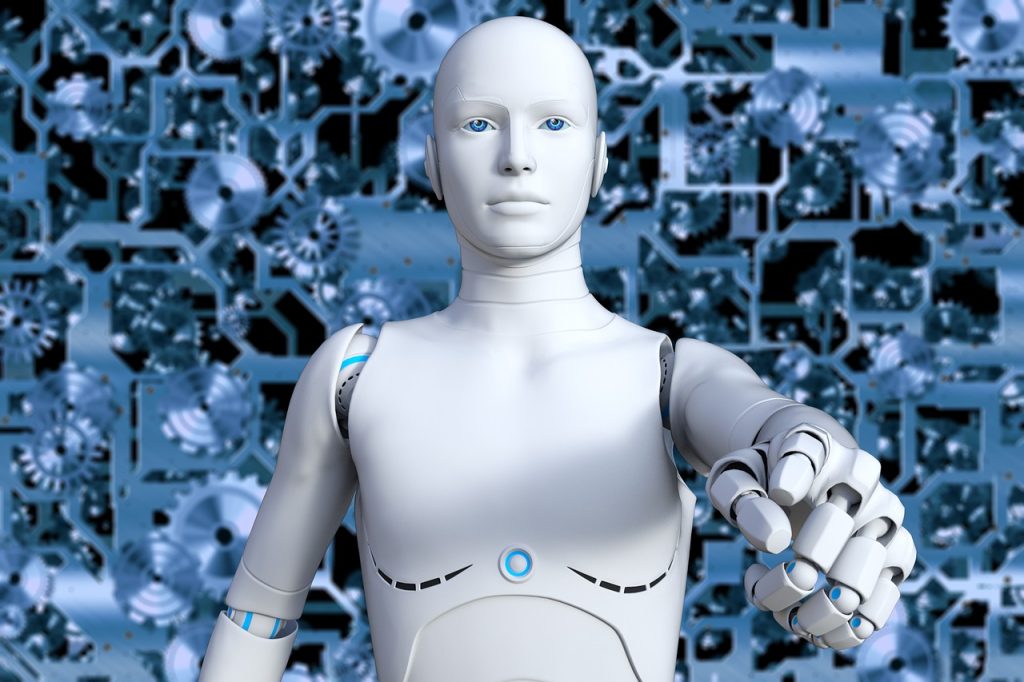
Neil Crofts
Co-founder
Holos Change Ltd

Co-founder
Holos Change Ltd

In science fiction, robots are often portrayed as helpful assistants or psychopathic killers who can interact with normal speech and are relentless. Think of Marvin, C3PO, Jarvis, T800 The Terminator, Hal, Eddie and Wall-E.
Some fictitious robots are humanoid, some are small vehicles, some are vehicles people can travel in, and some take the form of devices or applications.
Robots are machines that are capable of carrying out complex tasks autonomously.
In the real world, robots (including AI systems) are already doing jobs for us and already replacing humans in those roles. Most drones and remote-controlled vehicles are not robots, by this definition.
Robot lawnmowers and vacuum cleaners, warehouse robots, farming robots, security robots, delivery robots, robot carers, and software robots like Chat GPT are already doing and taking jobs from humans.
In the not-too-distant future, we can already see Robot cars, boats and aircraft. Robot factories and general-purpose robots like those made by Tesla and Boston Dynamics.
How should governments and society respond to robots?
According to Chat GPT, to which I delegated some of the research for this article, the risks to society posed by Robots and society include:
1. Job Displacement
As AI and automation advance, there is a concern that many jobs could be replaced by machines, leading to unemployment and economic inequality. It may require reskilling and adaptation to ensure people can find meaningful employment.
2. Bias and Discrimination
AI systems learn from data, and if the data used is biased or reflects existing societal prejudices, it can perpetuate discrimination. This can manifest in various areas like hiring, lending, and criminal justice, leading to unfair outcomes and exacerbating societal biases.
3. Privacy and Security
AI applications often rely on vast amounts of personal data, raising concerns about privacy and potential misuse. If AI systems are compromised, they can also become tools for cyberattacks, surveillance, or dissemination of disinformation.
4. Ethical Concerns
As AI becomes more capable, ethical considerations become crucial. Issues like autonomous weapons, surveillance technology, and the ethical treatment of AI subjects need careful regulation and responsible development to prevent harmful consequences.
5. Human-AI Interaction
Integrating AI systems into society requires thoughtful design and user-centric approaches. Challenges arise when AI lacks transparency, making it difficult for humans to understand its decisions, or when human trust is misplaced, leading to over-reliance or abdication of responsibility.
6. Economic Disparities
AI could widen the gap between developed and developing countries if access and adoption are not equitable. Wealthier nations may have better resources and infrastructure, leading to a technological divide that can further marginalize disadvantaged regions.
7. Unintended Consequences
Complex AI systems are inherently difficult to predict and control fully. Unintended consequences or unforeseen vulnerabilities may arise, potentially causing accidents, disruptions, or misuse with significant societal impact.
To consider each of these briefly…
1 – There is a long history of machines taking jobs from humans and an equally long history of social panic at the prospect of machines taking jobs from humans.
However, our robotic future will be far from being the first time society has faced similar challenges and the answers are simple, if counter-cultural. Firstly, the robots (or their owners) need to be taxed. The revenue from the tax can then be used to provide attractive lifestyles for humans – mostly through free or nearly free provisions of essentials such as food, housing, and education.
Even in a very highly automated world, there will still be plenty of roles for humans in caring, service, entertainment and sport as well as many other creative, technical and governmental fields.
There will be the opportunity to improve the quality of life for huge numbers of people if we take the right political decisions, but capitalism as we know it will need to change dramatically for that to take place.
2 and 3 – Bias and discrimination, privacy and security will need to be tackled by smart legislation that is genuinely designed to protect individuals and give them choice. Politicians have a poor track record on this, but AI can actually help – here is what Google Bard says:
Transparency: AI systems should be transparent about how they work and how they make decisions. This will help people to understand how the system works and to identify any potential biases.
Accountability: AI systems should be accountable for their decisions. This means that there should be a way for people to challenge the decisions made by the system and to hold the system accountable for any bias or discrimination.
Fairness: AI systems should be fair in their decision-making. This means that they should not discriminate against any group of people, regardless of their race, gender, religion, or other protected characteristic.
Diversity: The people who develop and train AI systems should be diverse. This will help ensure that the systems are not biased towards any particular group.
Monitoring: AI systems should be monitored for bias and discrimination. This will help to identify any potential problems early on and to take steps to correct them.
4 – Ethical Considerations and 7 unintended consequences are really scary. Military robots in the form of weapons systems programmed to make their own kill decisions are the stuff of dystopian sci-fi nightmares. So far, our track record on weapons legislation is patchy, but chemical and nuclear weapons are somewhat controlled – so it may be possible if supra-national institutions like the UN can be sufficiently empowered. Alternatively, an AI version of the MAD doctrine of Mutually Assured Destruction that kept the cold war cold, might be our best hope.
5 – Human AI interaction – a combination of high-quality design and learning and experience will help here. History shows that it always takes humans some time to develop the cultural antibodies to protect us from new media technologies. Radio, movies, TV, the Internet and social media were all cynically exploited in their early days before people and society worked out how to protect us from it. The same is likely to happen with AI.
6 – Economic Disparities – in reality, the richer parts of the world are also the older parts – Europe has a median age of 44.4, with an average birth rate of 1.53 children per woman (replacement rate is 2.1). Sub Saharan Africa has a median age of 19.7 and a birth rate of 4.67.
Richer countries will use robots to compensate for the ageing and declining population. Poorer countries will be able to use AI to leapfrog technologies – for example, Africa has largely gone straight to mobile and will also go straight to distributed electricity generation.
For balance – here is what Google Bard says about the social benefits of AI.
Artificial intelligence (AI) has the potential to bring many social benefits to society. Here are some of the most promising areas where AI could make a positive impact:
Healthcare: AI can be used to diagnose diseases more accurately, develop new treatments, and provide personalized care to patients. For example, AI-powered systems are already being used to identify skin cancer and predict heart disease.
Education: AI can be used to personalize learning, provide feedback, and help students learn at their own pace. For example, AI-powered tutors can answer students’ questions in real-time and provide customized instruction.
Transportation: AI can be used to improve traffic flow, reduce accidents, and make public transportation more efficient. For example, AI-powered traffic lights can adjust their timing based on real-time traffic conditions.
Environment: AI can be used to monitor pollution, track climate change, and develop sustainable solutions. For example, AI-powered systems are already being used to identify deforestation and track the movement of endangered species.
Security: AI can be used to detect fraud, prevent crime, and protect national security. For example, AI-powered systems are already being used to screen airline passengers and identify potential threats.
These are just a few of the many ways that AI has the potential to benefit society. As AI technology continues to develop, we can expect to see even more innovative and impactful applications in the years to come.
Here are some additional social benefits of AI:
Increased productivity: AI can automate tasks that are currently done by humans, freeing up time for people to focus on more creative and strategic work.
Improved decision-making: AI can analyse large amounts of data to identify patterns and trends that humans may not be able to see. This can help businesses make better decisions, from product development to marketing campaigns.
Personalized experiences: AI can be used to personalize each user’s products and services. This can lead to increased customer satisfaction and loyalty.
Enhanced safety: AI can be used to detect and prevent accidents, crimes, and other threats. This can make our world a safer place for everyone.
Neil Crofts is the CEO & Founder of Holos Change.